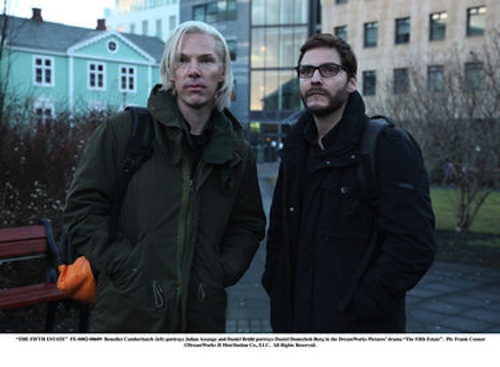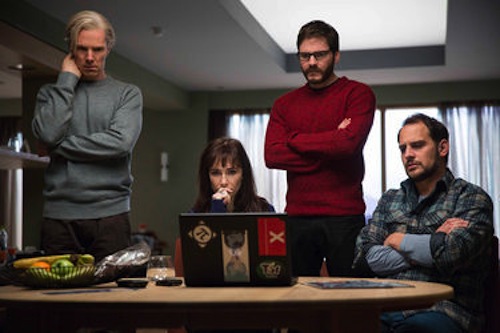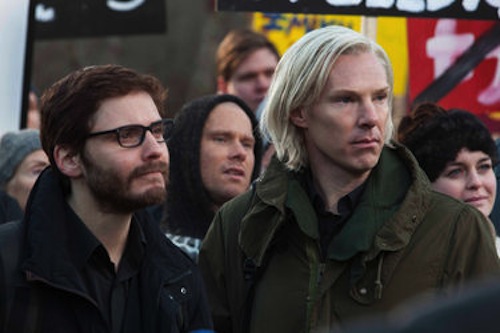Synopsis: A dramatic thriller based on real events, The Fifth Estate reveals the quest to expose the deceptions and corruptions of power that turned an Internet upstart into the 21st century’s most fiercely debated organization.
Release Date: October 18, 2013 MPAA Rating: PG-13
Genre(s): Drama, Thriller
Film Review

Production
The Fifth Estate is the story of WikiLeaks founder Julian Assange (Benedict Cumberbatch from Star Trek Into Darkness). Actually, to be more accurate, it’s the story of Assange as told through Daniel Berg (Daniel Bruhl from Inglourious Basterds). The film chronicles the meeting of the two men and Berg’s subsequent volunteering with Assange’s website, WikiLeaks.org. The website is set up as a whistleblowers’ forum, allowing sources to anonymously upload incriminating evidence against the rich and powerful entities of the world – the first victim is Bank Julius Baer, a Swiss bank that was illegally funneling money into offshore accounts for its wealthy clients. The bank’s leaders are indicted, and WikiLeaks moves on to publish documents as varied as Guantanamo Bay procedures, contents of Vice Presidential Candidate Sarah Palin’s private email account, and the secret bibles of Scientology. Things get real when WikiLeaks publishes a report about Kenyan Death Squads that results in the executions of two men. Then, the site receives a video of an airstrike in Baghdad, along with thousands of military logs and cables that Julian wants to publish. Berg draws a line, saying that the information could compromise U.S. security and cost people their lives. Assange and Berg quarrel over what is right while simultaneously trying to avoid confrontations with the FBI, the CIA, and the White House.

If there’s one word to describe The Fifth Estate, it’s tedious. The screenplay was written by Josh Singer (“The West Wing”), using two books as source material: Berg’s own “Inside WikiLeaks: My Time with Julian Assange at the World’s Most Dangerous Website and “WikiLeaks: Inside Julian Assange’s War on Secrecy” by David Leigh and Luke Harding. The narrative gets tangled up in a web of manufactured intrigue, but there is very little real drama in the film. Director Bill Condon (Gods and Monsters, The Twilight Saga: Breaking Dawn) tries to create tension where there is none; the only conflict in the story is between Assange and Berg over the leaked military information and it comes far too late to keep the audience engaged. To his credit, Condon tries to make it visually interesting, inserting news footage and interviews to add a sense of credibility and realism to the movie. However, with all of the techno-babble and internet-speak running rampant in the film, The Fifth Estate ends up feeling like The Social Network with less interesting characters.

Interestingly enough, there seems to have been more drama behind the scenes than in front of the camera during production of The Fifth Estate. The real Julian Assange was provided with an early draft of the screenplay and went on record saying how it presented an inaccurate portrayal of the events. Assange even went so far as to ask Benedict Cumberbatch, with whom he was friendly, to not participate in the film. Cumberbatch still made the film, obviously, but it was clear that the subject of The Fifth Estate did not approve of the depiction of the facts.
The theme of Citizen Journalism is what is at the root of The Fifth Estate, yet the film fails to take a decisive stand on the subject. It makes Assange out to be both a hero and a villain, and portrays WikiLeaks as a necessary yet harmful service. With all of the press coverage that has been afforded to WikiLeaks over the years, The Fifth Estate will no doubt find an audience. However, that audience may go away wondering what the big deal was.

Acting
The silver lining to The Fifth Estate‘s murky cloud is the acting. Both Benedict Cumberbatch and Daniel Bruhl are convincing, and it is really their film. There are small yet effective performances by Laura Linney (“The Big C”), Stanley Tucci (The Hunger Games), and David Thewlis (the Harry Potter movies), but it is Cumberbatch and Bruhl who carry the film. Cumberbatch’s Assange is a complicated man, brilliant yet socially inept, and the actor pulls it off masterfully. Bruhl is similarly good as Berg, a man who, while initially in awe of the genius of Assange, becomes his biggest adversary. When the two men share the screen, it’s difficult to look away. Nevertheless, the experienced thespians cannot save the mediocre script; there’s only so much they can do; the acting is engaging, even if the story is not.

Cast and Crew
- Director(s): Bill Condon
- Producer(s):
- Screenwriter(s): Josh Singer
- Story:
- Cast: Peter Capaldi (Alan Rusbridger)David Thewlis (Nick Davies)Anatole Taubman (Holger Stark) Alexander Beyer (Marcel Rosenbach)Benedict Cumberbatch (Julian Assange)Laura Linney (Sarah Shaw)Anthony Mackie (Sam Coulson)Stanley Tucci (James Boswell)
- Editor(s): Virginia Katz
- Cinematographer: Tobias A. Schliessler
- Production Designer(s):
- Costume Designer:
- Casting Director(s):
- Music Score: Carter Burwell
- Music Performed By:
- Country Of Origin: USA
